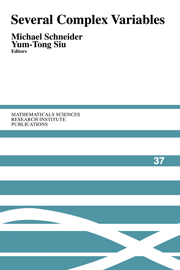Book contents
- Frontmatter
- Contents
- Preface
- Local Holomorphic Equivalence of Real Analytic Submanifolds in ℂN
- How to Use the Cycle Space in Complex Geometry
- Resolution of Singularities
- Global Regularity of the ∂-Neumann Problem: A Survey of the L2-Sobolev Theory
- Recent Developments in the Classification Theory of Compact Kahler Manifolds
- Remarks on Global Irregularity in the ∂-Neumann Problem
- Subelliptic Estimates and Finite Type
- Pseudoconvex-Concave Duality and Regularization of Currents
- Complex Dynamics in Higher Dimension
- Attractors in ℙ2
- Analytic Hilbert Quotients
- Varieties of Minimal Rational Tangents on Uniruled Projective Manifolds
- Recent Developments in Seiberg-Witten Theory and Complex Geometry
- Recent Techniques in Hyperbolicity Problems
- Rigidity Theorems in Kahler Geometry and Fundamental Groups of Varieties
- Nevanlinna Theory and Diophantine Approximation
Attractors in ℙ2
Published online by Cambridge University Press: 25 June 2025
- Frontmatter
- Contents
- Preface
- Local Holomorphic Equivalence of Real Analytic Submanifolds in ℂN
- How to Use the Cycle Space in Complex Geometry
- Resolution of Singularities
- Global Regularity of the ∂-Neumann Problem: A Survey of the L2-Sobolev Theory
- Recent Developments in the Classification Theory of Compact Kahler Manifolds
- Remarks on Global Irregularity in the ∂-Neumann Problem
- Subelliptic Estimates and Finite Type
- Pseudoconvex-Concave Duality and Regularization of Currents
- Complex Dynamics in Higher Dimension
- Attractors in ℙ2
- Analytic Hilbert Quotients
- Varieties of Minimal Rational Tangents on Uniruled Projective Manifolds
- Recent Developments in Seiberg-Witten Theory and Complex Geometry
- Recent Techniques in Hyperbolicity Problems
- Rigidity Theorems in Kahler Geometry and Fundamental Groups of Varieties
- Nevanlinna Theory and Diophantine Approximation
Summary
We investigate attractors for holomorphic maps from ℙ k→ ℙ k, emphasizing the case k = 2. The interest in attractors stems from the fact that when a map is subject to small random perturbations, the long-term dynamics of the resulting system live near the map's attractors. In the case k = 1, that is, the case of rational functions on the Riemann sphere, the attractors are either periodic orbits or the whole sphere. In higher dimensions, however, there are other possibilities, which we call nontrivial. In addition to giving some examples of nontrivial attractors, we prove some general results about such attractors inℙ 2, among them that a given map can have at most one nontrivial attractor K, that K is then connected, has pseudoconvex complement, and contains a nonconstant entire image of ℂ, and that an attractor for a map f is also an attractor for any iterate fn.
1. Introduction
We recall first some general notions from the theory of dynamical systems. See [Ruelle 1989] for background.
Information
- Type
- Chapter
- Information
- Several Complex Variables , pp. 297 - 308Publisher: Cambridge University PressPrint publication year: 2000
Accessibility standard: Unknown
Why this information is here
This section outlines the accessibility features of this content - including support for screen readers, full keyboard navigation and high-contrast display options. This may not be relevant for you.Accessibility Information
- 1
- Cited by
